

Explore the history, culture, people and beautiful landscapes of Vietnam on the 63Stravel travel app
Download the 63stravel app

Huong Tich Pagoda is located in Thien Loc commune, Can Loc district, Ha Tinh province. The temple is about 25 km northeast of Ha Tinh city; about 30 km southeast of Vinh city, Nghe An province.
Huong Tich Pagoda is located in the most special location, 650m above sea level and located halfway up the Hong Linh mountain range - a place called "Magnificent mountain range". The Huong Tich cave scene was chosen as a symbol of the famous Hong Linh mountain and was carved on Anh Dinh, one of nine bronze peaks cast in the 17th year of Minh Mang located in Hue Citadel.
Huong Tich Pagoda possesses a poetic beauty hidden among the hazy clouds of smoke. This is one of the oldest ancient temples in Ha Tinh and is associated with ancient anecdotes.
Tourists coming to Huong Tich Can Loc Pagoda - Ha Tinh will come to the "First Hoan Chau scenic spot", to the legendary Hong Linh Mountain with 99 high peaks associated with the legend of 100 phoenixes flying to find parking place. Coming here, visitors will be immersed in the harmony of nature, earth and sky, with the sacred realm, enjoy the wild and majestic beauty of a land of "masterpieces" and hear the legend of the Princess. Dieu Thien transforms Bodhisattva Avalokiteśvara to save sentient beings.
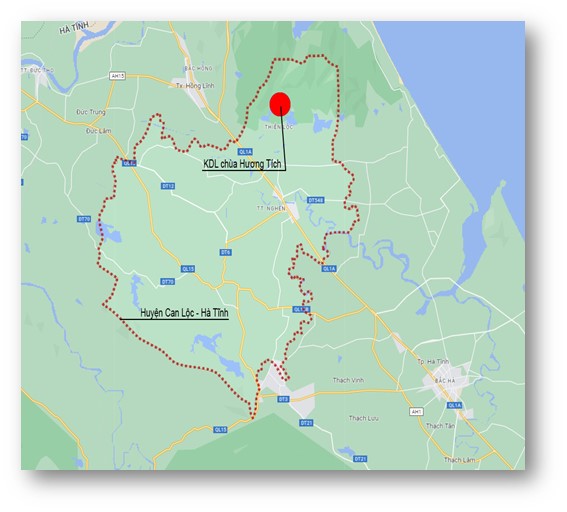
Location of Huong Tich Pagoda tourist area
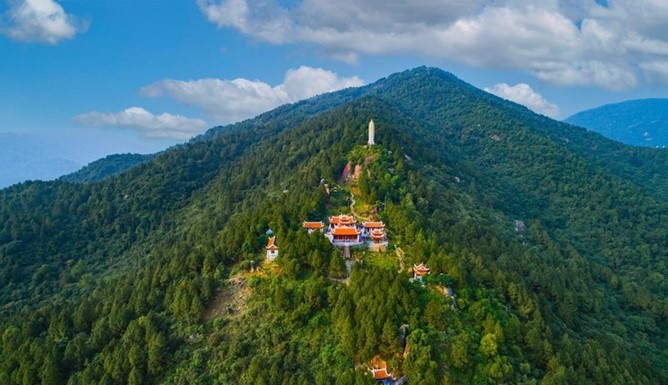
Huong Tich Pagoda is located on the majestic Hong Linh peak
Huong Tich Pagoda was recognized by the Ministry of Culture and Information (now the Ministry of Culture, Sports and Tourism) as a National Cultural Relic - Scenic Landscape in 1990 in Decision No. 309/QD-BVHTT. In 2009, the People's Committee of Ha Tinh province issued a decision on Huong Tich Pagoda tourist area as a provincial-level tourist area.
The annual Perfume Pagoda Festival is chosen as the opening festival of the Ha Tinh tourism year on January 6 and the Perfume Pagoda festival itself is held on the February 18 of the lunar calendar every year, which is the day Princess Dieu Thien transforms. Bodhisattva Avalokiteśvara. At the beginning of the new year, especially during the festival season, tens of thousands of people come to burn incense to worship Buddha, praying for a peaceful and prosperous life. Particularly for Ha Tinh people, Huong Tich Pagoda is considered the "Ancestral Altar", no matter where they are, the hearts of Ha Tinh people always turn to this sacred pagoda as to the roots of their homeland and nation.
Means of transportation to Huong Tich Pagoda
There are many means for visitors to choose when visiting Huong Tich Pagoda such as: plane, bus, train, motorbike. After arriving at the working area of the Tourism Area Management Board, visitors will have three options to get to Huong Tich Pagoda, including:
- Walk to Huong Tich Pagoda: Visitors can go to the pagoda by road. Starting the journey, tourists come to burn incense at Cua Rung temple to report and pray to the gods to bless the pilgrimage to Buddha's land safely and well. The road from Cua Rung temple to Buddha Ba rest stop is relatively flat, with pine forests whispering in the wind on both sides. When arriving at Soi cave (also known as Goat camp), visitors will encounter a small fork, the path to the west is the way to Bat Canh temple built in Truc cave. Am Bat Canh was built during the Tran dynasty, the reign of King Tran Nhan Tong, and today seems to still be preserved intact. This is a cultural relic of Taoism that helps visitors reminisce about a bygone golden age.
From Soi cave, go straight up to the Phat Ba rest stop (commonly known as Mieu Co), located next to the Huong Tuyen stream, below is Quy Khoc stream, above is a small hermitage, which is said to be the resting place of Cong. Lord Dieu Thien before being taken to Huong Tich by Bach Ho. The road from Buddha Ba rest stop to Huong Tich Pagoda is about 1 km long. On this road, visitors can linger and burn incense at Cau Temple.
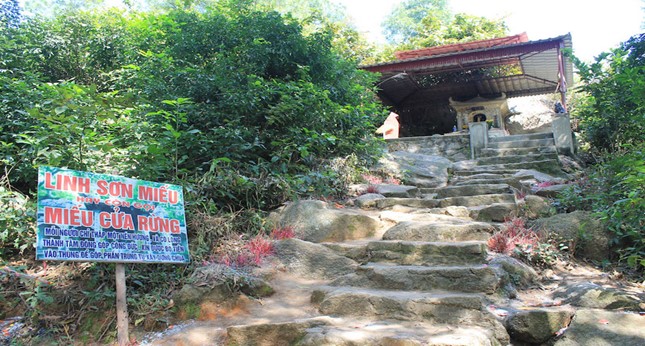
If walking, visitors can stop to burn incense at Cua Rung Temple to report and pray to the gods to bless their journey to the Buddha realm.
- Take the tram to the cable car: Visitors can ride the tram on the nearly 5 km road, on both sides of the road are rows of green pine trees, considered "miniature Da Lat".
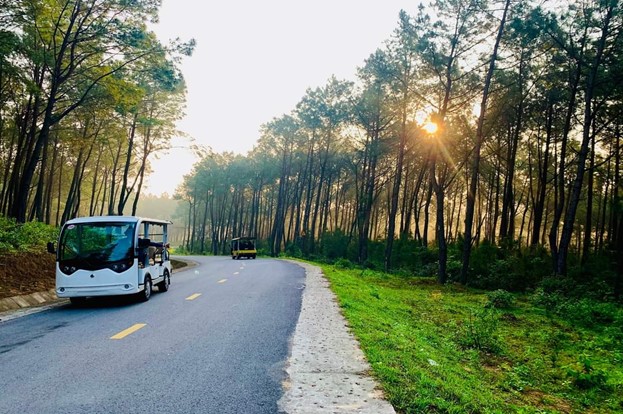
Visitors can admire the natural beauty on the winding road like a silk ribbon of Hong Linh mountain
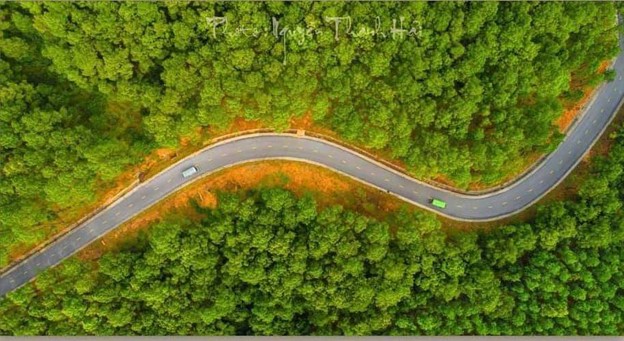
Tram route seen from above
- Take a boat or walk to the cable car: Going down Nha Duong Lake, visitors will freely immerse themselves in the green color of the vast, deep blue river. Then, stroll about 1 km to the cable car station at Mieu Co. From here, visitors can choose to take the cable car or walk to the temple.
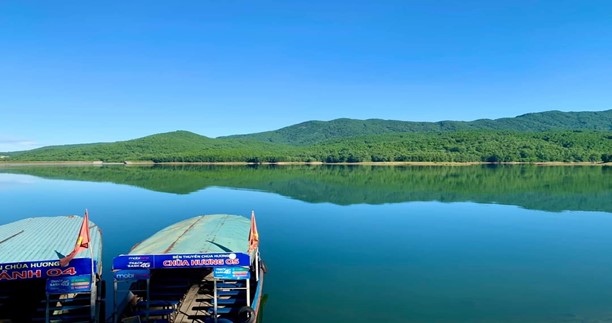
Immerse yourself in the deep blue beauty of Tang Lake
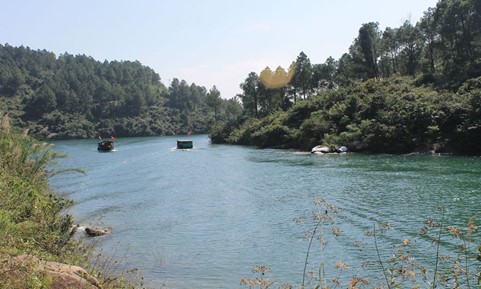
Taking a boat will help visitors admire the natural scenery before arriving at Huong Tich Pagoda
- Take the cable car: At the cable car station at Mieu Co, visitors will go through a road about 1 km long to reach Huong Tich Pagoda. This is a cable car system using advanced technology from Austria and Switzerland that has been in operation since 2012, with a total investment cost of 140 billion VND, maximum capacity of 25 cabins, currently only operating 20 cabins, Maximum speed 4.6 minutes/turn.

Tourists sit on the cable car and go through a road about 1 km long to reach Huong Tich Pagoda
The story of Huong Tich Pagoda
Coming to Huong Tich Pagoda, visitors will be immersed in the harmony of nature, earth and sky, with the sacred Buddha realm, hear the legend of Princess Dieu Thien transforming into Guan Yin Buddha to save sentient beings while enjoying the wild beauty. , the magnificence of a land of "masterpieces and spiritual people".
Legend has it that, King So Trang Vuong had three daughters, Dieu Duyen, Dieu An and Dieu Thien. When they reached adulthood, the king wanted the three of them to marry court officials in order to gain solid support in the future. However, unlike her two sisters, Princess Dieu Thien did not accept to marry the famous evil general. Therefore, she firmly objected, and this made King So Trang Vuong very angry. Too heartbroken, Ms. Dieu Thien left, then went to build a hermitage, practice, and take refuge in the Buddha's door right at the top of the Hong Linh mountain range.
However, the general did not give up and went to the place to set fire to force Dieu Thien to appear. Fortunately, Princess Dieu Thien and the monks and nuns were protected by the Buddha and sent Bach Ho to take her to Viet Thuong Thi to establish a hermitage to practice. The place she went to was Thieu Linh cave, located halfway up the Hong Linh mountain range.
Later, when King So Trang Vuong fell seriously ill, Dieu Thien offered both her eyes and her hand to save her father. The Buddha was moved by her filial heart and performed a spell to help Princess Dieu Thien's eyes shine again and her hands become full again. After that, she continued to practice and attained enlightenment, becoming the thousand-eyed, thousand-armed Avalokiteshvara Buddha today. At the place where Dieu Thien practiced, people built a pagoda, today's Huong Tich Pagoda.
Perhaps for a long time, tourists from all over have often wondered why Vietnam has two Perfume Pagodas, the Perfume Pagoda in Hanoi and the Perfume Pagoda in Ha Tinh. However, in reality, Huong Pagoda in Hanoi is not the original temple but a version of Huong Tich Pagoda in Ha Tinh. History records that the reason why Huong Pagoda was built in Hanoi was because the road from the capital to Huong Pagoda was very far, making Lord Trinh feel uneasy every time his concubine went to visit the Huong Pagoda festival. Therefore, Lord Trinh built another Perfume Pagoda in the mountains of Ha Son Binh, contributing to creating a more magical and poetic Perfume Pagoda.
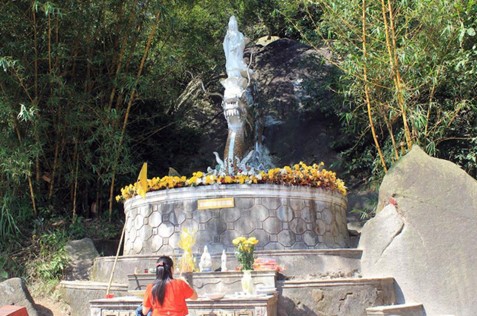
Mieu Co
History of Huong Tich Pagoda construction
Through legends, history books and archaeological artifacts, it is proven that the pagoda was built during the Tran Dynasty, then restored and repaired during the Le Trung Hung Dynasty. In the year of At Dau (1885), the pagoda caught fire; In the year of Tan Suu (1901), the Governor of An Tinh, Dao Tan, called on the people to rebuild the pagoda. During the restoration process, the old works of Huong Tich Pagoda were almost completely restored. In 1990, Huong Tich Pagoda was officially recognized as a National Cultural and Scenic Relic of Hoan Chau, becoming a famous spiritual attraction throughout Nghe An.
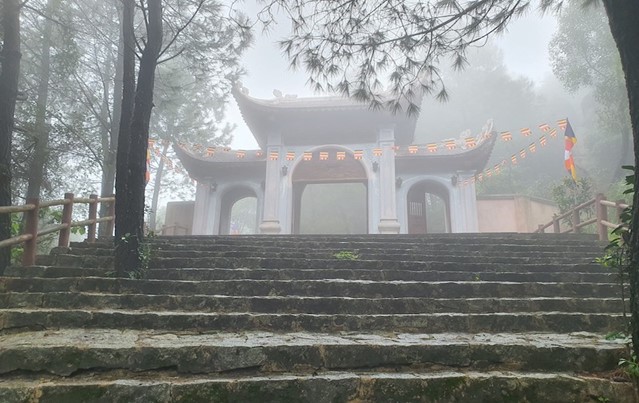
The three-entrance gate of Huong Tich Pagoda in the mist
Architecture and scenery of Huong Tich Pagoda
Huong Tich Pagoda is a large-scale cultural relic complex with a Buddhist temple, a God temple and temples associated with agricultural beliefs and mother worship beliefs of the Vietnamese people.
The entire campus of Huong Tich Pagoda is divided into three areas, including the Upper Palace, Thien Vuong Temple and Thanh Mau Temple - where Princess Dieu Thien attained Buddhahood. Right behind the grounds of Huong Tich Pagoda is a row of hundreds of years old trees with giant roots deep into the ground and lush foliage that radiates shade. Besides, visitors will see large rocks of various shapes scattered everywhere, making the space here more impressive and attractive. Around the pagoda are countless famous landscapes of Hoan Chau land such as: Co temple, Phun May hermitage, Tien Nu cave, Tien Tam stream and Quy Cry valley with anecdotes tinged with mysterious spirituality.
In the grounds of Huong Tich Pagoda, it can be said that Tam Bao Palace is the most unique place, attracting a large number of tourists to admire and burn incense. This place worships many ancient Buddha statues dating back hundreds, even thousands of years.
In particular, at Huong Pagoda, there are still 2 Buddha statues, a rare Kowloon temple made of black bronze and an ancient bronze bell that is being developed by the District People's Committee to request recognition as a national treasure.
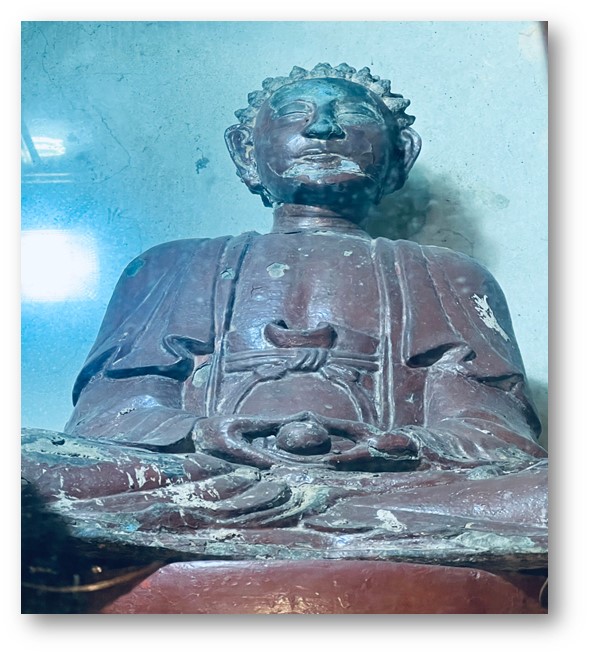
Ancient bronze Buddha statue
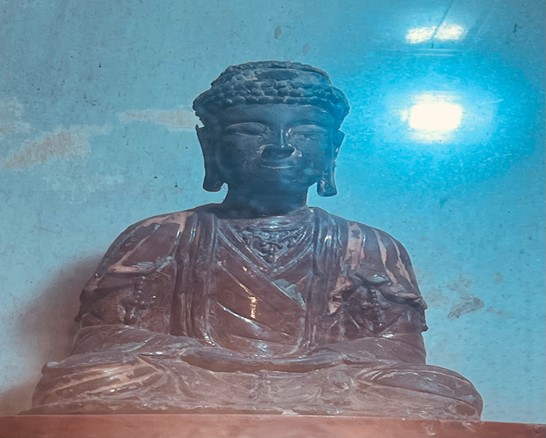
Ancient bronze Buddha statue
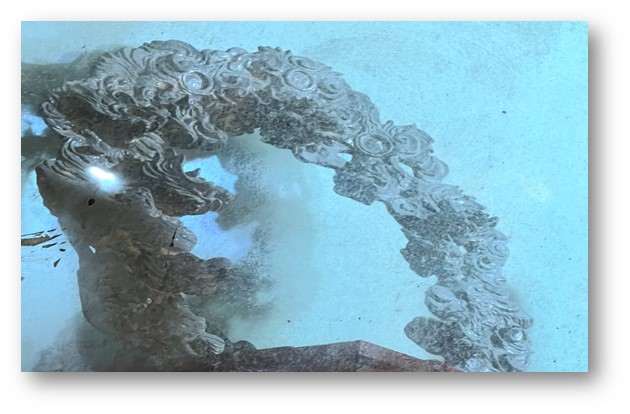
Ancient Cuu Long Palace
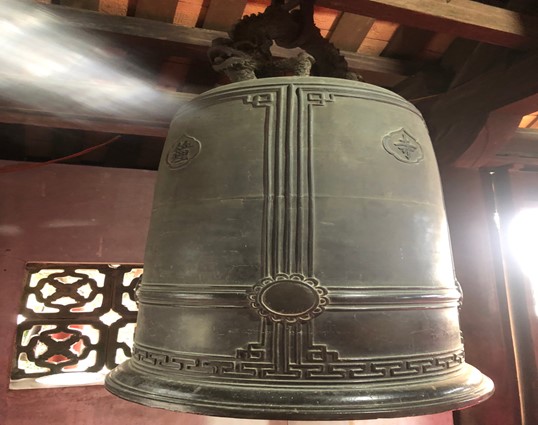
Ancient bronze bell
On the top of Huong Linh mountain, there is a small hermitage, where the statue of Guan Yin and other statues carved from boulders are placed.
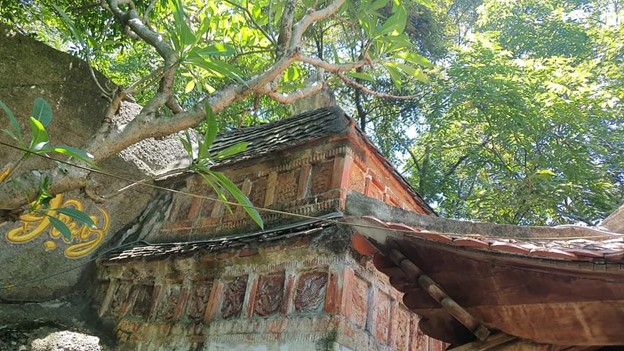
Phat Ba Am - where Princess Dieu Thien transformed into Buddha Avalokiteshvara
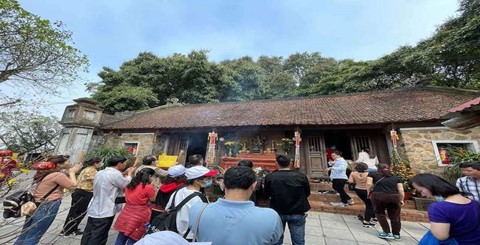
Huong Tich Pagoda is a stopping point for Buddhist believers every time they come to Hoan Chau
Most especially, because it is located at an altitude of 650m above sea level and halfway up the vast Hong Linh range, Huong Tich Pagoda possesses a breathtaking natural landscape that any tourist who sets foot on it will surely Everyone felt impressed and overwhelmed. Appearing before our eyes are magnificent mountains, vast green forests, fresh air, and the bustling sound of birds singing. All have created a picture of Huong Tich Pagoda that is both majestic and magnificent in front of nature, tinged with sacred colors, and mixed with mystery.
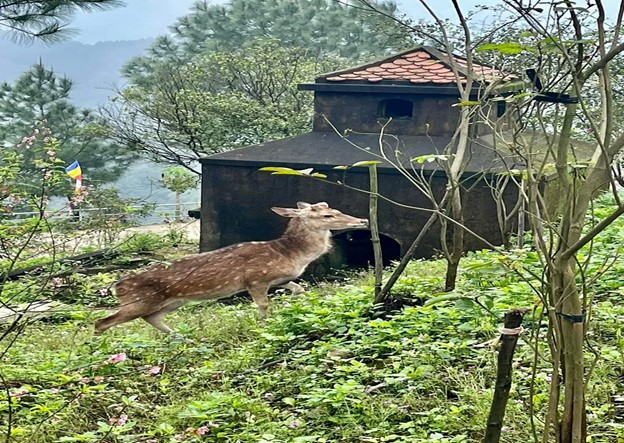
Huong Tich Pagoda is also home to many wild animals
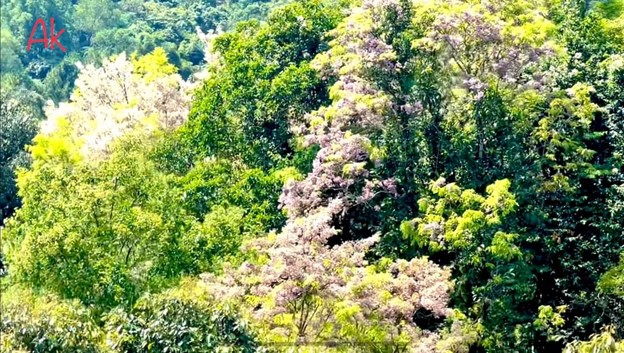
From the 11th lunar month is the blooming flower season in the Hong Linh mountain range
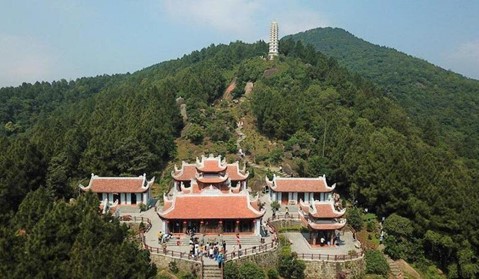
The entire campus of Huong Tich Pagoda is about 350m walk from the main pagoda
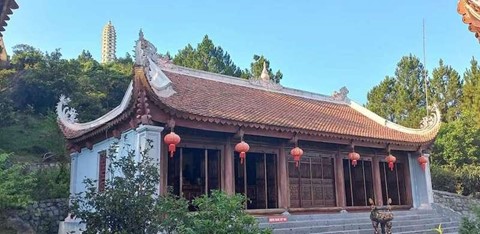
Huong Tich Pagoda is one of the most famous spiritual relics in the region, while still retaining its ancient architecture with ancient beauty, tinged with time.
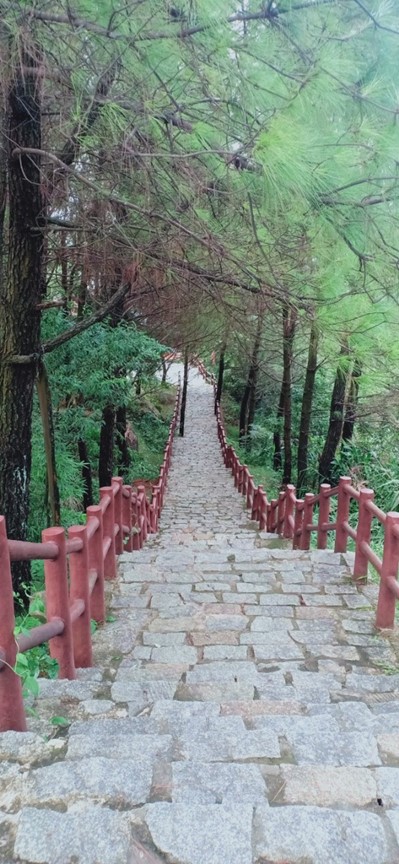
Road to Huong Tich Pagoda (where Trang Vuong Palace was located in the past)
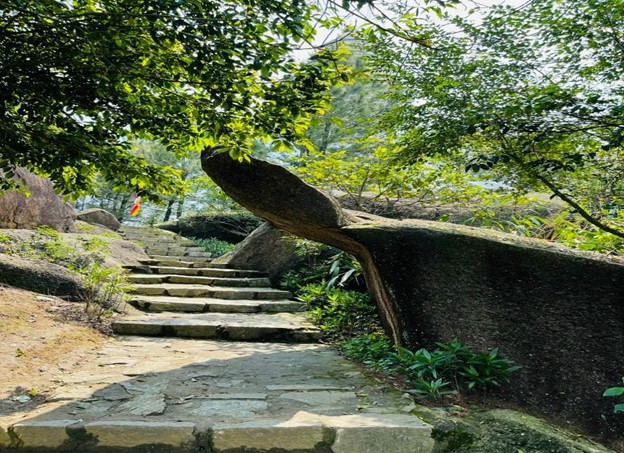
On the way, visitors will see the image of the Magic Turtle
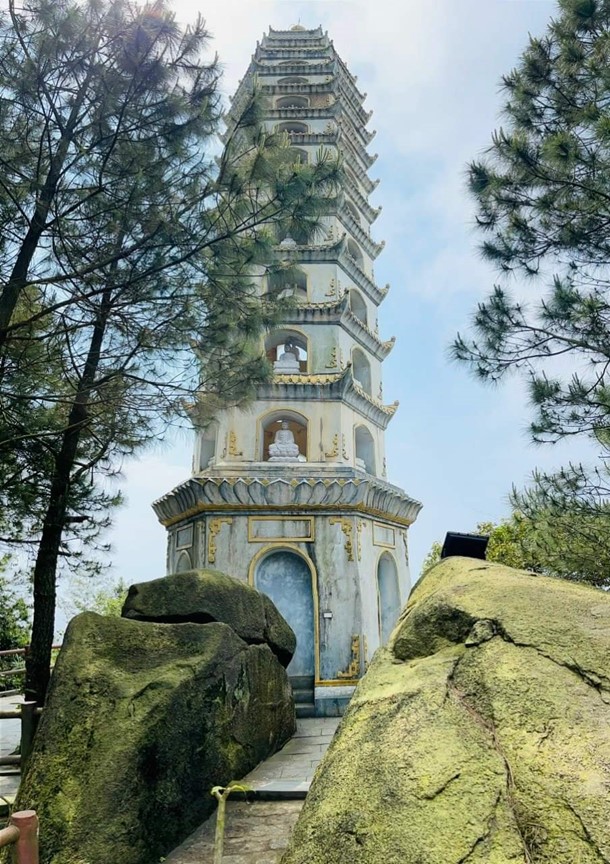
Going higher, visitors will see the Stupa with their own eyes
Huong Tich Pagoda Festival
Huong Tich Pagoda Festival is always one of the occasions that attracts a large number of tourists and Buddhists to visit and worship. Every year after the Lunar New Year, the Huong Tich Pagoda Festival is solemnly held and lasts until the end of the third lunar month. Normally, the main festival is held on the 18th day of the second lunar month, which is the day Princess Dieu Thien transformed into Bodhisattva Avalokiteshvara.
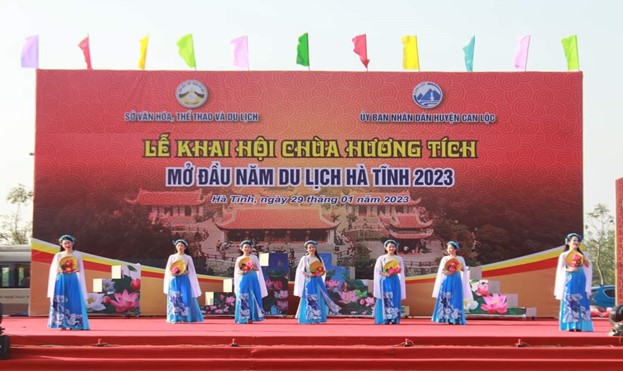
The opening ceremony of Huong Tich Pagoda - opening the Ha Tinh tourism year, is usually held on the 6th day of the first lunar month.
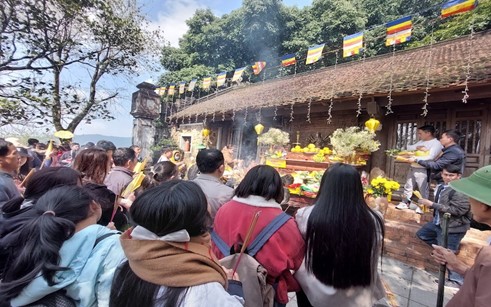
On the days of the Huong Tich Pagoda Festival, Buddhists will come to offer incense and pray
During the Festival, a series of activities imbued with folk culture will take place at Huong Tich Pagoda, helping people have a more realistic view of this sacred land.
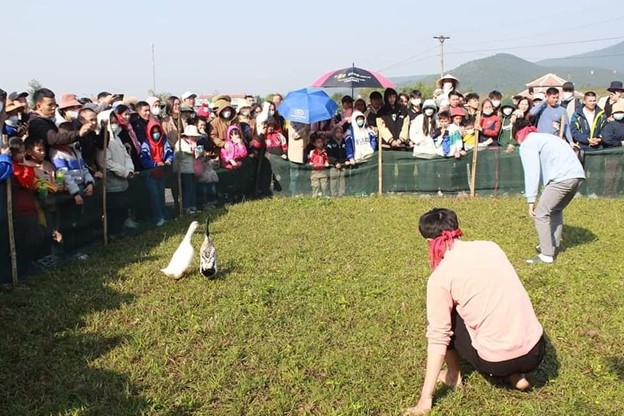
Duck catching game blindfolded
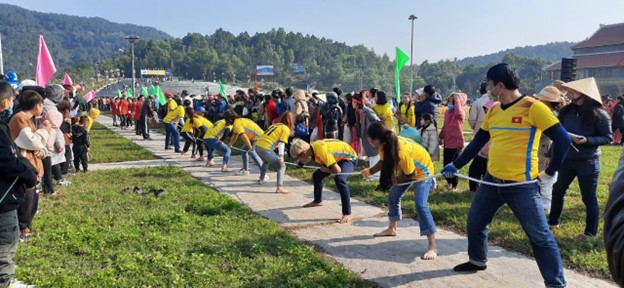
Game tug

Traditional objects
Not only does it attract tourists with its ancient beauty amid vast mountains, Huong Tich Pagoda is also a magical sacred place, a place of faith, helping each person find peace and serenity in their soul. If tourists want to learn more about the history and folk culture of this land of Hoan Chau, Huong Tich Pagoda will be an ideal and attractive destination not to be missed on their spiritual journey.
Ha Tinh 1902 view
Update day : 05/11/2023
Ngang Pass is a pass over the Hoanh Son range, a crucial point on the North-South natural road. Ngang Pass is famous not only for its historical factors but also as a famous landscape of the sunny and windy central region. At the top of the pass is Hoanh Son Quan, built during the reign of King Minh Mang of the Nguyen Dynasty, still standing tall through all the rain and sun until now... Ngang Pass has become a legend in literature and poetry. Hoanh Son is 50 km long, running from the Truong Son range in the west to the East Sea. The highest peak in the mountain range has an absolute altitude of 1044 m. In the past, to cross this mountain range, people often had to go up Ngang Pass, which is 256 m high and 6 km long, which is very difficult. Since August 2004, a road tunnel was completed to make travel between Quang Binh and Ha Tinh more convenient. Looking for a place to rest before crossing the pass and Hoanh Son range, I stopped at Hoanh Son beach. Located right at the foot of Ngang Pass, or rather right at the junction from National Highway 1A, going close to the sea, branches - one branch goes to the pass along a thousand-year old road, the other branch goes through Ngang Pass tunnel through the mountains and Hoanh beach. Wild and hidden mountains... Hoanh Son beach is located in Ky Nam commune, Ky Anh district, Ha Tinh province - less than 2km from the foot of Ngang pass (in the direction of the North - South highway), on the other side is Quang Binh territory. Perhaps in this "endless" place, everything is still wild like the pass and the majestic Hoanh Son range. Hoanh Son beach is protected by mountains so it is discreet and windless; Clear, blue water. This place inherits the climate as well as the scenery of both sea and mountains. At the beach, you can see the Hoanh Son range - a mountain range running from the Truong Son range - stretching out to the East Sea. There are also rocky beaches spreading from the mountains to the sea like "jumping rocks" beaches like many beaches in the Central region... Hoanh Son beach is small and narrow, cannot be compared to the majestic tourist-industrial beaches in the central region such as Sam Son (Thanh Hoa), Cua Lo (Nghe An)... but it impresses with its grandeur and the wilderness of nature, the simplicity of human life. Hoanh Son Beach will certainly attract those who love adventure and exploration. Let's see, one afternoon on the beach, the sky was dark, there was no one and suddenly a herd of cows appeared. The Hoanh Son strip protrudes into the dim blue sea, the waves leap up onto the rocky beach... And try it, go up the pass in the afternoon and come down when it's late; I can hear the poem of Ba Huyen Thanh Quan: "A piece of love between me and myself...".
Ha Tinh 1912 view
March to November
Son Kim hot mineral water eco-tourism area is located in Son Kim 1 commune, Huong Son district, Ha Tinh province. From City. Vinh, you can travel by motorbike or car along National Highway 1A, cross Ben Thuy Bridge (a bridge connecting Nghe An and Ha Tinh provinces), from here continue following National Highway 1A for about 15km more. to Hong Linh town. From Hong Linh, you continue to follow Highway 8 southwest for about 65km to reach the Son Kim hot mineral water eco-tourism area. The tourist area is located at the confluence of two streams, Ngam Thep stream and Nuoc Sot stream. The temperature of the hot mineral springs here is from 75-90 degrees Celsius. As many people know, bathing in the hot mineral springs will be effective in curing a number of diseases such as muscles, bones and joints, spine, nerves, and skin diseases. , blood vessels, at the same time, also helps us restore function, health, reduce stress and fatigue. You will really feel relaxed when immersing yourself in the hot water here and admiring the extremely beautiful scenery of the surrounding nature. In addition to the hot mineral springs, the nature here also makes you admire its wildness and beauty. This place is known as the "unawakened fairy" because of the beautiful landscape like a watercolor painting mixed with the cool green of the forest and the jade green of the mineral lakes. Coming here, you can immerse yourself in a space filled with green trees, admire the lakes, small houses built right on the side of the mountain along with white foam waterfalls.
Ha Tinh 1921 view
From January to December
Trai Tieu Lake is a famous tourist area not only in Ha Tinh but also known to many people for its extremely romantic space. Trai Tieu Lake is located in My Loc commune, Can Loc district, Ha Tinh province, an irrigation project with a capacity of 15.6 million m3 of water to serve irrigation and water regulation in the region. The climate in My Loc and Can Loc has two distinct seasons: rainy season and dry season. The rainy season lasts from March to October, while the dry season is influenced by the cold winter of the North. The average temperature in the rainy season ranges from 23 degrees Celsius to 33 degrees Celsius. Summer in Ha Tinh generally has quite intense peak heat, influenced by the southwest wind, which in some months reaches nearly 39 degrees Celsius. Due to the high mountain shape of the Truong Son range, when the wind blows from Laos To the right, over the mountain range, the cold air lowers the humidity and dries the wind, so when it goes low, the wind becomes hot. The best time for those planning to go to Trai Tieu Ha Tinh lake is the rainy season, May and June, when the temperature is suitable for fun activities and sightseeing. Trai Tieu Lake tourist area is quite large with an area of up to 21 km2, the main highlight is the large lake, an area with extraordinary appeal to attract tourists. Surrounding the lake is surrounded by green mountains and forests, the space is extremely fresh and fresh. The water surface is as heavy as a mirror, the shadows of clouds, sky, forests and mountains are clearly printed on the lake like a giant reflective mirror. In the distance, standing from this bank and looking to the other bank, you will see a few red tiled roofs, especially in the early morning air, the scene seems more magical and shimmering in the mist. Going through the gently windy hills, you will find yourself lost in a mysterious forest, immersing yourself in a vague feeling. Then you can rent a tourist boat to see the sights. Gliding gently on the water, the boat will give you one surprise after another. The vast lake bed seems to go on forever with no end in sight. The waves gently pat the boat's side, creating ripples in layers, giving visitors a soft floating feeling. Taking a boat up Khe The, you will encounter dangerous streams and strong flowing water, making traveling by boat more difficult. Up in the area near Khe The, the landscape becomes increasingly wild and wild, increasingly distant with signs of human habitation. All year round nature is covered with luxuriant greenery, endless green. Standing from here, you can see the most comprehensive panorama of Trai Tieu Lake, the deep blue lake is silent and endless without seeing a stop for your eyes. Around the lake there are farms of people, you can stop the boat and step ashore to visit the farm with many interesting seedlings. Coming here, you can enjoy many delicious and strange fruits: Phuc Trach grapefruit, Huong Son orange, Hong Dong Lo. In addition, coming to Trai Tieu Lake, you will have the opportunity to transform into a fisherman or a catfish to collect firewood around the edge of the forest or cast a fishing rod. Fishing here is very quiet, you can easily hunt big fish that have lived in the lake for a long time. For a more strange experience, try fishing at night, the space seems to shrink in front of the fishing rod, everything around is strangely quiet and peaceful. It seems like this place is for monks to live in seclusion, or people who just like a quiet space to live alone. At night you can stay at the lake on floating houses along the shore. There is a system of eco-lodges floating on the lake to serve tourists staying overnight. The scene at night is difficult to describe in any language, from the atmosphere to the dim space and the weak moonlight, it is extremely romantic and memorable. From the Giang Man mountain range, drops of water accumulate, bringing an endless source of fresh water to Trai Tieu lake. For irrigation purposes, people from a very early age knew how to prevent dams to retain water to serve agricultural life as well as other irrigation activities. Due to discovering the potential of the rare natural landscape, Can Loc irrigation company has renovated and developed this place into a famous eco-tourism area in Ha Tinh.
Ha Tinh 2044 view
May to August
Thien Cam Beach is located in Cam Xuyen district, Ha Tinh province, about 20km from the city center. Although not as busy and famous as Cua Lo beach (Nghe An), Thien Cam beach attracts tourists because of its inherent wild and pure beauty. The ideal time to explore Thien Cam beach is summer, especially from June to July. During this time, you will really feel the clearness, freshness and calmness of the sea here. From August to October, Thien Cam beach is in storm season, so you should avoid traveling to Thien Cam during this time. Traveling to Thien Cam beach, you will have the opportunity to immerse yourself in the cool and blue sea water. Thien Cam Beach is located in the Central province so the water is clearer and cleaner than beaches in the North. Thien Cam Beach has 3 beaches, of which the most beautiful is the main beach which is 3km long, the remaining two beaches are 10km long. The blue, emerald-colored sea water, the gently stretching white sand beaches and the colorful rocky beaches have created a wild and rustic beauty in Thien Cam sea. If you are looking for a place to fully view this beautiful beach, look to Thien Cam Mountain right next to the coast. With an altitude of 108m above sea level, just standing at the top of the mountain you can see and observe the entire Thien Cam sea and surrounding islands. On Thien Cam Mountain, there is also Cam Son Pagoda, formerly a temple to Ho Quy Ly's father and son, built in the 13th century. Here, visitors can also admire the giant's "million-year" footprints that are still clearly visible on the sky. stone slab. Thien Cam has two main islands: Hon Boc Island and Hon En Island. Closer to the shore is Hon Boc with its giant elephant-shaped mountain and interesting rocks reaching out to the sea. Offshore is the small island of Hon En, which looks like a hand protecting fishermen from storms from generation to generation. To visit these two islands, you can contact the tourist boats or hotel reception directly to book a boat tour with ticket prices ranging from 500-600k/boat. Not only with the pristine beauty of the sea and islands, Thien Cam beach also attracts tourists with its diverse and rich seafood cuisine at cheap prices. Visitors can buy seafood at Cua Nhuong Fishing Port or catch seafood themselves in the rocks and process it on site. Types of seafood that can be mentioned include: one-sun squid (price 250k/fish), clams (30k/kg), clams, grouper porridge, tuna, shrimp, oysters,... In addition to typical seafood dishes, Thien Cam tourist destination is also famous for grilled goat specialties. Goat meat in Thien Cam is soft, sweet, lean, low in fat and thin-skinned and is often eaten with wing leaves dipped in ginger soy sauce, attracting many diners when coming to Thien Cam beach. Traveling to Thien Cam in the summer, don't forget to enjoy the Cu Ky bird - Thien Cam's specialty. The bird is only as big as a regular chicken, with brown or blue feathers and a green dot on the neck. Cuckoo bird is processed into different dishes such as: bird porridge, grilled bird, roasted bird. Cu Ky bird meat has a special fragrant and delicious taste. It would be a pity if you come to Thien Cam and miss this specialty.
Ha Tinh 1799 view
March to October
In addition to the well-known name Hong Linh, this ancient mountain also has another name in Vietnamese called Ngan Rong (Roar) with a measured length of about 30km, the mountain direction is Northwest - Southeast. According to local people, Hong Linh includes 3 mountain groups: Dun Ngan, Thien Tuong and Eo Bau and a system of a series of caves and streams. There are quite famous caves that are often mentioned such as Ham Rong, Che Hai, Da Hang... It is not for nothing that this place is called "the symbol of the sacred soul of rivers and mountains", Hong Linh has existed over time, associated with the ups and downs of history. The top of the Flag Tower on the mountain was once the place where Mai Thuc Loan's son built a base, or Lau Mountain was the place where Ly Thanh Tong chose to build his palace. There are many different myths and legends still passed down by people related to this mountain and the years it has passed. Because of this, many pagodas, temples, and shrines, numbering up to more than 100, were built here by people. Some places have become famous pilgrimage destinations that many visitors from near and far visit for incense sticks every holiday such as Huong Tich Pagoda, Chan Tien Pagoda or Tien Son historical relic cluster. People come to Hong Linh mountain not only for pilgrimage, but also for spring travel, sightseeing, and enjoying the cool and peaceful mountains and forests. More specifically, Tien Son has been recognized by the State as a national historical relic cluster. Every year there is a traditional festival with many different activities to welcome tourists from all over. On the 15th day of the first lunar month every year, pilgrims from all over come here to worship and pray for peace.
Ha Tinh 1788 view
From January to December
Ke Go Lake is considered the largest lake in Ha Tinh, part of the Ke Go nature reserve spread over 3 districts of Cam Xuyen, Ky Anh and Huong Khe. Ke Go Lake was completed in 1979. Ke Go Lake not only serves human life but it has become a peaceful destination that attracts tourists here after the tiring pressures of life and work. Ke Go Lake is located less than 20 km southwest of Ha Tinh town center. Transportation here is also very simple, visitors can ride a motorbike, which will be very suitable for tourists who like to travel or take a car or bus to come here. From Ha Tinh center, tourists follow National Highway 1A to Cam Binh, then turn right along Cam Xuyen Street to reach Ke Go Lake. However, visitors should be careful when coming here because the road to Ke Go Lake is quite deserted, there is a section of dirt road that is quite slippery so visitors should move carefully. Ke Go Lake is an artificial lake, but the beauty here is no less than that of natural lakes, captivating the hearts of tourists when they come here. The mountains and forests seem to embrace Ke Go Lake, reflecting a multi-colored picture on the lake's surface: The yellow color of the sunset as the afternoon fades, the green color of the mountains and forests, the vast, airy sky, making visitors filled with emotions. feel excited when you come here. On hot summer days, when you need to find peace. Visitors can come here to immerse themselves in the vast space of the mountains and forests, breathe fresh air, look at the vast lake surface and listen to the sound of the wind dispelling all worries. A special feature, Ke Go Lake has a bridge curved like a shrimp. This is the place that attracts many tourists coming here. Standing from the bridge, looking out into the distance at the poetic scenery of heaven and earth. There are large and small oases looming on the lake surface. Visitors feel like they are lost in a strange, mysterious fairyland. Visitors can immerse themselves in the vast space and watch the golden sunset sparkle on the lake's surface, making Ke Go Lake look like a dreamy wanderer holding someone's feet to this peaceful place. An evening of camping, eating grilled food, and chatting happily with family or friends is truly an unforgettable memory when coming here. The nature of Ke Go Lake is like a traveler's soulmate, always by your side and giving you a feeling of comfort after the troubles of urban life. Ke Go Lake is part of the large Ke Go nature reserve, covered with many blue sky forests, and the flora is also very rich and diverse. To date, there are more than 300 species of vertebrates and many rare species are in danger of extinction. This place is also the land of many precious flowers. Ke Go Lake is increasingly invested and perfected with many services, visitors can participate in many other activities: boating along the vast lake, enjoying local specialties, boat racing, fishing or Play other activities like badminton, volleyball, etc. To make your trip more complete, visitors can also visit and burn incense at the memorial site of late General Secretary Le Duan. The pure atmosphere of the mountains and forests gives visitors a feeling of calm in their souls. Or enjoy wonderful moments at the fresh, cool Thien Cam beach with wild large and small rocks. The sound of waves lapping and embracing the rocky beaches, inhaling the fresh sea breeze are truly unforgettable moments.
Ha Tinh 1908 view
March to August
Dinh Le Temple is also known as Linh Cam Dai Vuong Temple, formerly belonging to Viet Yen Ha commune, Viet Yen district, now Tung Anh commune, Duc Tho district, Ha Tinh, worshiping the founding god of the Later Le dynasty, Linh Cam Dai Vuong. Dinh Le. Dinh Le is from Lam Son, Tho Xuan, Thanh Hoa, and is Le Loi's nephew. From 1418 to 1427, Dinh Le participated in many important battles of the Lam Son Insurgent Army, achieved many victories, and contributed significantly to the final victory against the invading Ming invaders. Winning the battle, Dinh Le was awarded the title of Private Commander by Le Loi. In April 1425, the Ming army followed the Ngan Pho river to attack the Do Gia base of the Lam Son insurgent army, but was counterattacked and had to flee through Tung Linh mountain to enter the La river and return to Nghe An citadel; Dinh Le's army intercepted and attacked here, killing more than 1,000 people. In March 1427, Dinh Le and Nguyen Xi were ordered to bring 500 Thiet troops to reinforce General Le Nguyen in Tay Phu Liet, expelling the Ming army to Mi Dong. Two generals riding elephants fell into the swamp and were captured by the Ming army. Dinh Le refused to submit and was killed. In 1428, after ascending the throne, Le Thai To posthumously awarded Dinh Le the title of Entering Internal Control with the title of Tu Do, the title Dinh Thuong Marquis, and the title Linh Cam Dai Vuong. In 1484, Le Thanh Tong family appointed him Grand Master of Ban Quoc Cong, and later promoted him to Hien Khanh Vuong. Remembering his contributions in this land, the people built a temple to worship Dinh Le at the place where he was previously stationed on Tung Linh mountain, on the banks of Tam Soa. Previously, Dinh Le temple was located about 400m from the current location. After this place was taken by the French as a military post, the temple was moved to a new location. The temple is currently located on a low, relatively flat hill. The Northwest and Southwest sides border the residential area, the Southeast side borders strategic road 28. The relic still has the upper palace, gazebo, gate and temple yard surrounded by a system of walls and entrance gates. The wall is built of bricks and mortar, in the middle there is a hole shaped like a lemon flower, the four corners are built with pillars, and lotus buds are placed on top. Tac Mon is like a screen blocking the entrance, the outside surface creates a yellow tiger relief, standing majestically with head and tail raised high. Go through the gate to the gazebo, built in 1937 in a double-match style with two floors, eight roofs, and four-sided doors. The date of the gazebo's restoration reads "Bao Dai Dinh Suu (1937). The upper palace is a four-pillar house with three compartments, two gables, four jackfruit wooden rafters in the four-pillar-stack-dau style (also known as the Ruong house). At the top are engraved four Chinese characters "Long live the Holy Palace". The middle hallway has a kneeling-style wooden incense burner carved with flowers and vines on both sides, and a dragon flanking the moon and face in front. The door is constructed in the "upper but lower" style, consisting of many doors joined together with wooden pegs on top. The remaining three sides are surrounded by brick walls. The middle space worships the tutelary god Dinh Le with a sacred throne, a royal tablet engraved with the title Linh Cam Dai Vuong, a wooden sword placed in lacquered wood inlaid with gilded wood, and a system of incense burners and gilded wooden offerings. On January 17, 2006, Dinh Le Temple was classified as a National Monument. Source: Duc Tho District Electronic Information Portal
Ha Tinh 1922 view
Nguyen Loi Temple is hidden at the foot of Bach Ma Mountain in Bao Thinh village, Duong Trai commune, Huong Son district, now Son Binh commune, Ha Tinh province. Nguyen Loi, a general who participated in many major battles in Do Gia - Huong Son district, established a base to fight the Ming invaders in Nghe Tinh region, was one of 18 comrades-in-arms of Le Loi present at the Lung Nhai oath ceremony. Nguyen Loi is the first son of General Nguyen Nhu Lam, a fourth-generation descendant named Le Loi, now the head of the lineage in Tho Xuan Thanh Hoa. During the reign of King Thieu Binh Phong: scholar and scholar, middle-ranking scholar and public servant, special golden prince, honorary physician, lawyer of the country's military, entered the country from the concubine, captain of the district's capital city. , Nguyen Tuong Cong, Four Thuy Simplified Stars; Died on February 25. Nguyen Loi's wife was the first child of King Le Thai Tong, her name was Yen Quoc, the head of state was a princess, her first name was Minh Tu, she died on January 6. After the victory over the invading Ming army, on March 5, 1428, Le Loi bestowed merit badges on 93 people. Nguyen Loi was ranked 17th among the 93 founders of the Le dynasty, and was given the national name Le. On November 7, 1434, the Marquis of the Royal Palace, Senior General Nguyen Loi, passed away while he was holding the position of Western Path Controller - Left Radiation. Considering his contributions to the cause of helping people save the country, King Le Thanh Tong posthumously awarded him to the ranks of righteous heroes. Nguyen Loi Temple is structured in Nhi style, including 2 main parts: lower palace and upper palace. The lower palace has the most typical horizontal architectural structure, consisting of 3 compartments and 2 gables built with closed walls. The roof is covered with yin and yang tiles, and on the top of the roof there is a decoration of two dragons flanking the moon. The house's interior structure is designed in a four-pillar style "inner is a bridge, outer is a roof" which is very popular in Nghe Tinh villages. The structure of the upper palace consists of 3 compartments and 2 gables, surrounded by walls built with bricks, the roof is covered with yin and yang tiles, on the top of the roof in the middle is embossed with the image of a tiger holding the sun, the 2 ends are the image of a dragon's head embossed with mortar and pieces of porcelain trying to piece together. The interior has altars to Nguyen Loi and his descendants, complete with traditional worship objects. This is a famous historical relic, dating back to the 15th Century, and was ranked as a national historical relic on December 28, 2001. Source: Son Binh Commune Electronic Information Page
Ha Tinh 1897 view
Thai Yen Temple was recognized as a National Monument on July 20, 1994. Thai Yen Temple is located in Thai Yen commune, Duc Tho district, Ha Tinh province, worshiping the Tutelary God Tam Lang Linh Ung (Snake God) and Chinh Dong Ngoc Nu (Mother). The temple was built in the 18th century (sometime before 1741). The temple is located on a land area of about 5,000 square meters at the beginning of the village, with a three-court structure: upper palace, middle palace, lower palace. In front of the temple is a semicircular lake with clear blue water - considered the dragon's eye, located in the village's dragon land. Passing through the large yard of the three-entrance gate, the middle gate is built with a Nghi Mon house with a structure of 2 pillars, 6 columns, the roof is covered with 4 winding dragons, the head raised high to the top of the roof. On the roof of the ritual gate is embossed a dragon's face stroking its mane, beard and fierce horns. The lower hall is made of ironwood with 4 trusses and 14 columns, the floor is tiled with red bricks, in front there are large Chinese characters embossed with pieces of porcelain on wood assembled together with the beams: "Van Co Anh Linh" ( middle room), "Chiem Nhu Tai" (right room), "Lai Nguyen An" (left room). In the middle of the room is a large incense burner made of lacquered wood and elaborately carved with gold. In front of the incense burner is a dragon sword stand and a sign with the two Chinese characters "Chinh Khi", two large cranes standing on turtle bodies on both sides; The two compartments on both sides hang two bronze bells, on the bell are embossed with 3 words "Thai Yen Tu" (Thai Yen Temple - left compartment) and 4 words "Vinh Phuc Tu Chung" (Vinh Phuc Pagoda Bell - right compartment) . The middle palace is adjacent and parallel to the lower palace, consisting of three rooms and two gables; Inside, there are many offerings such as incense burners, incense burners, candlesticks, and wooden vases. In particular, there are three massive gilded palanquins, elaborately carved with symbols, scimitars, nameplates, and symbols. The spirit master, dragon throne, and deity tablets are offered by the villagers. In the upper palace, in the hallway, there are two round statues made of jackfruit wood kneeling with arms folded in front of their chests supporting incense burners, with folk style (bulky belly, wearing long pants, short hair, big ears, wide face, biceps). tall, big nose, slanted eyes). The main door has four wings painted with dragon, glass, tortoise, and phoenix colors; The two armpit doors and one wing depict a crane standing on the back of a turtle swimming in a lotus pond. Inside the main hall above are the dragon thrones and tablets of the Tutelary Gods and gods of the village; Below is an altar with two rows of carved, painted and gilded tablets offered by many generations of villagers... Every year, in the spring, Thai Yen Temple holds a big festival, people in the commune organize cultural and sports festivals until the full moon of the first lunar month such as tug of war, football matches, volleyball, table tennis, and chess. generals, art competitions... Every two years, Thai Yen organizes a palanquin procession on the 7th day of the first lunar month. Source: Duc Tho District Electronic Information Portal
Ha Tinh 1891 view
Nguyen Du memorial area is located in Tien Dien commune, Nghi Xuan, Ha Tinh. Coming here, visitors will have the opportunity to learn more about the life and career of Nguyen Du and also have the opportunity to understand more about the Nguyen Tien Dien family. Nguyen Du (1765 - 1820), full name To Nhu, nickname Thanh Hien, originally from Tien Dien village, Nghi Xuan district, Duc Quang district, Nghe An town (now Ha Tinh province) but was born and raised in Thang Long (Hanoi today). His father is Hoang Giap Nguyen Nghiem and his mother is Tran Thi Tan from Hoa Thien village, Dong Ngan district, Kinh Bac region (now Bac Ninh province). Since childhood, Nguyen Du has deeply absorbed the cultural essence of all three regions: Nghe An - Thang Long and Kinh Bac. That's why Nguyen Du grew up to become a well-educated, highly talented person, proficient in both Buddhism and connoisseurs of exams and drawing. The work The Tale of Kieu is a clear testament to Nguyen Du. This is a great contribution to Vietnam's literary treasure. Historical relic Nguyen Du's memorial area was built so that scholars, writers and domestic and foreign tourists who love The Tale of Kieu can come and burn incense at the grave of Nguyen Du - a great national poet, a great poet. Cultural world-honored Great people. This is a cultural relic site located in the Nguyen Tien Dien family relic complex. This relic complex is a complex including many relics: the temple of the Great King Dr. Nguyen Hue; temples of Nguyen Nghiem and Nguyen Trong; Nguyen Quynh altar; 2 Tu Van houses; Great poet Nguyen Du's tomb, Nguyen Du museum and Nguyen Du church. Nguyen Du church was built in 1825, right on the garden of his house in Tien Giap hamlet. Inside there is an altar built of sand lime, above which hangs a horizontal panel with the four words "The Red Mountain's Pedigree" given by Hoang Phu Phai, a filial grandmaster of the Qing Dynasty, in the 55th year of the Qianlong Dynasty (1790). along with a stone tablet engraved with the words "Thanh Hien Nguyen Tien Sinh". Next to Nguyen Du church is Nguyen Du museum - a place to display many precious original documents and artifacts directly related to the life and career of the great poet Nguyen Du. Currently, this is an area displaying nearly 1,000 documents and artifacts, typically the pen of Nguyen Du, the Kieu version printed from an engraving in 1866, the book The Tale of Kieu written in calligraphy style (unique), calligraphy The longest Tale of Kieu in Vietnam (unique), collection of Tales of Kieu published in many languages, collection of books about Nguyen Du... Coming to Mr. Nguyen Du's Memorial Area, visitors will not only have the opportunity to admire the scenery here but also have the opportunity to learn more about the historical and cultural value and humanity of the Nguyen Tien Dien relic complex. In particular, if you come here in the early days of spring, you will enjoy Nguyen Du's poetry nights at the Literature House in the Nguyen Du Memorial Area. The Great Poet Nguyen Du relic site is a complex of architectural works to worship and commemorate Nguyen Du and the outstanding talents of the Nguyen family in Tien Dien, such as Duke Nguyen Hue and Xuan Nguyen Nghiem. , Lam Khe Hau Nguyen Trong, Dich Hien Cong Nguyen Dieu, Que Hien Cong Nguyen Ne... The cultural heritages in the Relic Area are still preserved and have special historical, cultural, and scientific value.. . helps us learn about the origin, formation, development, cultural traditions, academics... of the Nguyen family in Tien Dien as well as a look at the life, career, and contributions of the great poet Nguyen Du and the Nguyen family in Tien Dien for Vietnamese literature. This is also a reliable source of information to learn about the beliefs, customs, cultural and spiritual life of Tien Dien village in particular, and Vietnamese village culture in general in the development of history. nation. Source: Vietnam National Tourism Administration
Ha Tinh 1811 view
On December 9, 2013, Dong Loc Junction Relic Area was recognized as a Special National Historical Site. Dong Loc Junction relic area is a relic complex with many meaningful works, typically the following 12 items: 1. Dong Loc junction relic area has 3 entrance gates arranged on 3 routes towards the relic area, arranged according to the traditional three-entrance architecture including: Main door and 2 side gates. 2. Dong Loc Junction Victory Monument is an immortal symbol of the strength, determination to win, and the spirit of overcoming all hardships and dangers of the youth volunteer force, soldiers, and traffic workers. , police, militia... 3. The memorial stele of the National Youth Volunteer Martyrs. Registered nearly 4,000 heroic martyrs. The names of the heroic martyrs and young volunteers who sacrificed their lives at Dong Loc Junction will be remembered forever, for generations of children and grandchildren to admire, respect, and be proud of. 4. The grave site of 10 female heroic martyrs and young volunteers at Dong Loc intersection is 10 white graves register 10 young female volunteers of Platoon 4, Company 552. 5. The stele memorial for the heroic martyrs of the Transport sector who sacrificed their lives in Ha Tinh. Register and commemorate 842 Heroes and martyrs of the Transport sector who sacrificed their lives in the resistance war against the US to save the country in Ha Tinh area; 6. Transport industry symbol column. Located right in the middle of the three-way intersection: Lac Thien - Dong Loc, Khe Giao - Dong Loc, Ba Giang - Dong Loc. To honor the heroic victories of soldiers on the Transportation front; 7. Dong Loc Junction Bell Tower has majestic architecture, shimmering light, located on Mui Mac hill, and is considered one of the most beautiful bell towers in Vietnam today. 8. Dong Loc Junction Temple is located on Mui Mac Mountain (next to Dong Loc Junction Bell Tower). It is a place to worship the Gods and Spirits of the Heroic Martyrs and young volunteers who sacrificed their lives in the two national resistance wars, the Heroic Martyrs who sacrificed at Dong Loc Junction, 10 girls and officers. and people died at Dong Loc battlefield. 9. The statue of 10 girls at Dong Loc Junction recreates a realistic moment of 10 young volunteer girls on duty to level bomb craters and lead the way to the front line. They are arranged in different positions. 10. La Thi Tam Hill (Moi Mountain) is the place to witness the fierceness of the Dong Loc battlefield, witness the footprints, associated with the name of the daughter of Song La, Hero of the La People's Armed Forces Thi Tam. 11. Traditional house of the Vietnam Youth Volunteer Force, where the history of the Youth Volunteer Force appears most vividly and clearly. 12. Dong Loc Junction Traditional House There is a simulation table programmed with an electronic system, recreating the fierce and devastated battlefield scene of Dong Loc Junction during the war years, as well as the intention. the determination to open roads and traffic, the brave and courageous spirit of our army and people at this "death coordinate". Source: Ha Tinh province electronic information portal
Ha Tinh 1779 view
Nguyen Tuan Thien's tomb and temple relics were built in 1494 after the death of the founding father Nguyen Tuan Thien. According to historical records, Nguyen Tuan Thien (born 1401 - 1494) was a national founder of the Le Dynasty, from Phuc Dau village, Phuc Duong commune, now Son Phuc commune, Huong Son district, Ha Tinh province. From a young age, Nguyen Tuan Thien nurtured the will to destroy enemies and save the country. He gathered like-minded people to form the Coc Son insurgent army to rebel against the domination of the Ming Dynasty. In February 1425, Nguyen Tuan Thien brought the Coc Son insurgent army to pay homage to Binh Dinh King Le Loi, asking to cooperate in fighting. Le Loi and Nguyen Tuan Thien became brothers. From then on, the Coc Son army became a part of the Lam Son insurgent army and Nguyen Tuan Thien was a good general. At this time, the Ming army withdrew and took refuge in Nghe An citadel. The insurgents and the people joined forces to besiege the citadel and continuously won many victories. In particular, the fierce battle at Khuat Giang (Nam Mountain) quickly defeated the Ming army here, with great contributions from the Coc Son army and Nguyen Tuan Thien. After the battle of Khuat River, Le Loi - Nguyen Trai moved their headquarters from Tien Hoa cave to Luc Nien citadel on the Thien Nhan range. Following the momentum of victory, Lam Son insurgents marched down the plain, liberated Nghe An, Thuan Hoa in the south, then advanced to Thanh Hoa, Dong Quan... completely liberating the country. Due to his talent and merit in fighting the enemy, when considering his merits and deciding on rewards, King Thai To ranked Nguyen Tuan Thien among the founding heroes of the country, was given the title of Le Thien and was awarded the title of General Manager and Deputy Marshal. In the first year of Thuan Thien (1438), he was promoted to the position of Tinh Tinh Tuyen Luc Trung Liet Minh Nghiep, Cong of National Founding, Do General Manager, Deputy Marshal, Trung Lang Great General, Serving the Great General, with the title Dai Tri Tu. Some time later, he asked the mandarin to return to his hometown, staying in Ninh Xa land (now Trung Ninh village, Son Ninh commune, Huong Son). After his death, local people buried him and set up a temple on Kim Quy hill. Nguyen Tuan Thien Temple consists of 2 buildings, architectural in Nhi style, an area of about 3000m2, 1.5m above the field surface, around and on the mound are planted many types of trees such as eucalyptus, camphor, and mother of pearl. .. The upper palace consists of 3 walls built around with tiled roofs, the wood used to make the house is mostly jackfruit and ironwood. Inside is the place to place the altar of the main deity and a painted wooden canopy with gilding inscribed with genealogy and family names. Le Loi awarded it. The worshiping house is located in front of the upper palace, made of square wooden columns, with a new modern tiled roof, and in the worshiping house is placed "The stone that tied the elephant of Duc Hau - Nguyen Tuan Thien". Behind the temple is his grave, a pyramid-shaped earthen tomb, 7m in diameter, about 2m high, looking like a high mound rising behind the temple. After years of serving the Le Dynasty, when he was old, the court chose Ninh Xa land to rest in, he found a burial ground for himself in Kim Quy Son, after more than five centuries his tomb was still preserved. protecting the status quo from then until now. His temple is currently in Son Ninh commune, Huong Son district, and has been ranked as a national historical and cultural relic by the Ministry of Culture and Information. Source: Son Ninh Commune Electronic Information Page
Ha Tinh 1757 view